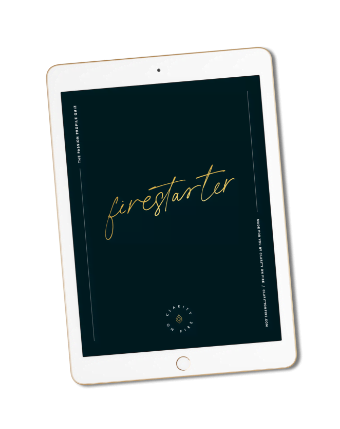One of the things you must become OK with when you decide to start your own business, and particularly when you’re a coach, is rejection.
I get rejected all the time! (And by “rejected,” I don’t mean that people tell me “no.” That actually doesn’t happen very often. Typically, being rejected just means someone was super excited by coaching and then … they completely disappear and fall off the face of the planet. They run away.)
It’s not personal, and it rarely bothers me anymore. I know it has far more to do with the potential client’s fear and lack of readiness than it has anything to do with me.
But being in the habit of getting rejected has made me very aware of why people run away from personal growth and evolution, and also the things people do to sabotage themselves when they’re this close to making a change after being stuck for a long time.
ONE SELF-SABOTAGING HABIT IS NOT VALUING CHANGE ENOUGH TO BEGIN WITH
This isn’t even the biggest trend I see (I’ll talk about that in a minute), but it’s something I see often enough that I’m sure you’ve probably been here at least once.
Uncomfortable truth #1: People tend to use lack of money as a catch-all excuse for not investing in themselves.
But what’s also true is that when people absolutely have to invest in something, they’ll find a way, even if they’re low on funds. Maybe their car breaks down, and unless they get it fixed, they can’t get to work. Or maybe they’ve got a chronic toothache and need dental surgery.
Even people who are worried about money will invest in something they believe is absolutely necessary to their lives or will alleviate some big pain they’re experiencing.
And sadly, often times we don’t think our emotional pain is “worthy” of our time and attention, at least not in the way a car or a tooth is. Physical stuff is more tangible and immediate, and it’s easier to pay attention to and “fix.”
The people I’ve seen go from stuck, unfulfilled, and unhappy to passionate, clear, and motivated are …
the ones who treated their emotional pain as equal to their physical pain.
They naturally understood that spending years in a fog of confusion, malaise, or mediocrity was just as insidious as driving a jacked-up car or living with chronic physical pain.
Sure, fixing your car is obvious and necessary, and it will help you get to work so that you can at least keep surviving. But in 5 years, when you’ve junked the car or upgraded but you’re still emotionally miserable or unfulfilled … there’s a big likelihood you’ll regret honoring your physical problems more than your emotional pain.
What also makes it easy to focus on the physical, rather than the emotional, is that the physical comes with deadlines …
THE WORST SELF-SABOTAGING HABIT OF ALL IS THE INABILITY TO SAY “YES” OR “NO”
Think about it. You were able to decide to fix your car (or get surgery) because you had to. If you didn’t fix it right now you were going to suffer immediate and very undesirable consequences. The problem came with a built-in deadline, and you were forced to say “yes” or “no” to fixing the problem.
Emotional pain isn’t like that.
Unfortunately, you can spend years in malaise, uncertainty, confusion, overwhelm, dissatisfaction, or mediocrity (all of which count as BIG emotional pains, in my book) with your life being in no physical danger.
We get so used to being in pain, and we’re often so afraid of the unknowns involved in taking a risk that we just … stay put. For one more day. And then another … and another.
And when we get really close to making a change (like the potential clients I’ve had who run away) we often sabotage ourselves even further by using another catch-all excuse:
“I’m going to think about this decision until I ‘know’ for sure.”
Uncomfortable truth #2: We say “maybe” instead of “yes” or “no,” and then we proceed to think about it forever.
Ooh, man. Thinking makes us feel like we’re doing something, doesn’t it? It sounds so productive.
But if you’re incredibly honest with yourself, there’s not much that sitting around and thinking really does for you. In fact, it often keeps you stuck in the same cycle of overwhelm, anxiety, and uncertainty that you’re likely already in.
It’s just a convenient way we prevent ourselves from taking action that feels scary and uncomfortable in the moment, but that’s likely way better for us in the long run.
(And besides, if you could have figured things out solely by thinking about them … wouldn’t you know the answer by now?)
LET’S STOP SABOTAGING OURSELVES AND DO SOMETHING PRODUCTIVE INSTEAD
If you want to make changes in your life, it’s time to take one monumental step:
Give yourself an ironclad deadline.
A week, a month, a year. Whatever. Pick a date, and decide that by this time, you’ll either …
Have decided to value your emotional pain as much as your physical pain. And if money is truly a barrier, that’s fine! There’s nothing wrong with saving for what you want to do (quitting your job, signing up for coaching, traveling the world, whatever!). Just give yourself a deadline, so that it’s real.
And/or …
Have decided to stop ‘thinking’ by a certain date, and start doing.
Please don’t be one of those people who gets stuck “thinking about making a change” for years. (Oof. I just shuddered!)
Pick a date, and if you haven’t figured it out on your own by that day, then it’s time to do something about it (something that involves action, not more thinking).
So, which of these self-sabotaging patterns do you recognize in yourself? Share with us in the comments.
Much Love,
Rachel (+ Kristen)
P.S. In a few weeks, we’ll be opening enrollment for our much-loved (because it’s easy, simple, and way affordable) online program, The Passion Plan Virtual Experience. It’s one of the ways you can stop thinking, start doing, and make actual change in very little time. If you want to be the first to know when it opens and when we give out $50 discount codes, get on our VIP list here.




“Give yourself an ironclad deadline” – this is something I’ve had to learn while running my own business as well. I do take the time to think through decisions when I’m confronted with a ‘this’ or ‘that.’ But setting a deadline is important. I do, however, think that sitting around and thinking does an awful lot for you (assuming you do have a deadline and eventually make a decision). I spend a lot of time thinking through decisions with a notepad to write out my thoughts.
Thanks for the post, I’m new to the blog and enjoying it!
I would say that I had been ignoring my emotional pain for quite a while. I was depressed, unhappy, and had zero motivation. I kept telling myself that it was too scary to leave a steady, good-paying job to go out and do something I really love. All I would do is think about what I really wanted to be doing.
Then I started having anxiety attacks, which really scared me. I decided that I needed to actually move forward with what I really wanted to do, even though it really scared me. So I went ahead and put in my notice. Once I did that, and let everyone know what I really wanted to do and that I was doing it, I had such a feeling of relief! I’m happier and everyone has told me how they’ve seen this change in me. I don’t have anxiety attacks anymore, and I don’t feel depressed and unmotivated anymore.
My last day at my job is January 8th, and I couldn’t be happier or more excited to start doing what I really love and what I am really
passionate about!
Great read. It’s so true that we tend to live in “maybeland” forever. Often in life answers will never come 100% clear (though that would be great.)